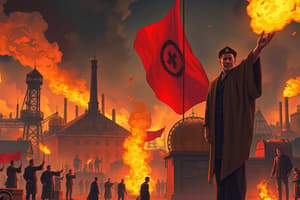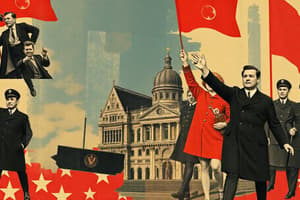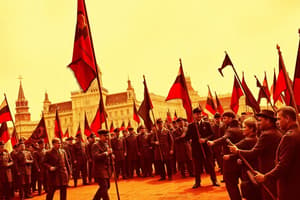Podcast
Questions and Answers
Who founded the Bolshevik Party in Russia?
Who founded the Bolshevik Party in Russia?
Vladimir Lenin
In what year did the Bolshevik Party seize state power in Russia?
In what year did the Bolshevik Party seize state power in Russia?
October 1917
What was the era known as following the Bolshevik takeover in Russia?
What was the era known as following the Bolshevik takeover in Russia?
New Economic Policy
What were the two main economic strategies implemented in Russia after the Bolshevik takeover?
What were the two main economic strategies implemented in Russia after the Bolshevik takeover?
Which country spread its influence beyond its borders, establishing Communist states and supporting left-leaning political groups across Europe?
Which country spread its influence beyond its borders, establishing Communist states and supporting left-leaning political groups across Europe?
What were the common goals shared by all branches of the socialist movement?
What were the common goals shared by all branches of the socialist movement?
Who laid the foundations for socialism by advocating for society to own and control the means of production?
Who laid the foundations for socialism by advocating for society to own and control the means of production?
Which philosopher's theories formed the basis for scientific socialism, aiming to understand historical materialism and class struggle?
Which philosopher's theories formed the basis for scientific socialism, aiming to understand historical materialism and class struggle?
What type of society did Karl Marx envision, where the proletariat would overthrow the bourgeoisie and lead to a classless 'communist' utopia?
What type of society did Karl Marx envision, where the proletariat would overthrow the bourgeoisie and lead to a classless 'communist' utopia?
During which period did the Russian Revolution take place, leading to the establishment of communist regimes in parts of Eastern Europe?
During which period did the Russian Revolution take place, leading to the establishment of communist regimes in parts of Eastern Europe?
Who was a key figure in the Russian Revolution that led to the establishment of communist regimes in parts of Eastern Europe?
Who was a key figure in the Russian Revolution that led to the establishment of communist regimes in parts of Eastern Europe?
What political ideology influenced the establishment of communist regimes in parts of Eastern Europe following the Russian Revolution?
What political ideology influenced the establishment of communist regimes in parts of Eastern Europe following the Russian Revolution?
Flashcards are hidden until you start studying
Study Notes
Socialism in Europe and Russian Revolution
The ideas of socialism have shaped modern political discourse across Europe, with their roots reaching back to philosophers like Karl Marx and Friedrich Engels. These ideologies became particularly influential during the period surrounding the Russian Revolution, which eventually led to the establishment of communist regimes throughout parts of Eastern Europe. This article will delve into key aspects of European socialism's evolution—from its theoretical underpinnings to practical applications via the Russian Revolution—and examine how these movements influenced global geopolitics.
Socialism in Europe
Socialism is based on the idea that society should own and control the means of production. Its foundations were laid by philosophers such as Robert Owen, Henri de Saint-Simon, and Louis Blanc, who sought to address societal issues caused by industrialization. However, it was Karl Marx whose theories formed the basis for scientific socialism, aiming to understand historical materialism and class struggle.
Marx envisioned a society where the proletariat would overthrow the bourgeoisie through a series of stages culminating in a stateless, classless 'communist' utopia characterized by collective ownership and democratic planning. While various left-wing parties, unions, and organizations emerged advocating different forms of socialism across Western Europe in the late 19th century, much of this intellectual activity took place in urban centers, universities, and coffee shops rather than among the working classes themselves.
Russian Revolution
Russia, however, presented unique conditions for the spread of Marxist thought due to its autocratic regime and rapidly developing industrial base. It was within these circumstances that the Bolshevik Party emerged, founded upon the teachings of Vladimir Lenin.
Lenin, a devoted follower of Marx and Engel's revolutionary doctrines, believed Russia could avoid capitalist development altogether, skipping straight from feudalism to communism. He emphasized party discipline and centralization of power, leading his followers to seize state power in October 1917. They ushered in the era known as New Economic Policy, followed later by Stalin's Five Year Plans, both of which attempted to steer Russian society towards planned economic growth alongside the construction of a totalitarian one-party system.
While initially borne out of idealistic beliefs seeking social justice, the Bolshevik takeover initiated an unprecedented experiment in collectivization and political repression that transformed Russia profoundly. By 1920, Soviet Union leaders had begun spreading their influence beyond Russia's borders, establishing Communist states while directly supporting left-leaning political groups across Europe.
Consequences and Legacy
Throughout the twentieth century, the rise of Soviet communism inspired numerous socialist uprisings abroad, with varying degrees of success. In countries like Czechoslovakia, East Germany, Poland, Hungary, Bulgaria, Romania, and Albania, communist systems emerged, often imposed following WWII by military force or treaty arrangements. Although some of these societies achieved social mobility and prosperity compared to prior eras, they simultaneously suffered from authoritarian rule, repressive policies, and rampant corruption.
In contrast to these hardline regimes, other nations, such as Sweden, Norway, Denmark, and Finland, pursued strategies promoting social democracy, achieving higher standards of living without sacrificing individual liberties. Despite differing approaches, all branches of the socialist movement shared common goals, including solidarity, equality, and fairness.
Today, debates continue concerning whether post-capitalist models can thrive outside of authoritarian structures. Many argue that social welfare programs and public goods distribution, emblematic of social democracy, render a more humane alternative to hard-line dictatorships. As we reflect on these tumultuous periods of history, it remains vital to learn from the past yet remain open to new perspectives fostering peaceful coexistence and progressive change.
Studying That Suits You
Use AI to generate personalized quizzes and flashcards to suit your learning preferences.




